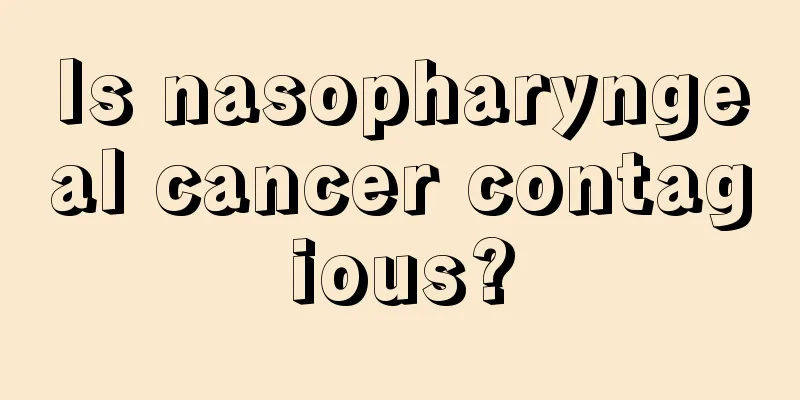Is nasopharyngeal cancer contagious?

|
Is nasopharyngeal cancer contagious? Nasopharyngeal cancer is a disease that troubles many patients and many families. Many people are worried about whether nasopharyngeal cancer is contagious. Experts point out that the so-called transmission means that a disease is transmitted from one person to another through some means. Infection requires three conditions: infection source, transmission route and susceptible population. Clinical data prove that cancer patients themselves are not infection sources. This means that nasopharyngeal cancer is not contagious. Experts have conducted experiments in which cancerous tissue removed from a cancer patient was directly implanted in another person and failed to survive and grow. Animal experiments have also proven that when cancerous animals and healthy animals were kept together for a long time, no infection was observed after repeated observation and examination. This also proves from a certain perspective that nasopharyngeal cancer is not contagious. In addition, cancer is not currently listed as an infectious disease in the world, and patients are not isolated as infectious diseases. The incidence of cancer among medical staff is not higher than that of the general population. Although it is currently believed that the occurrence of certain cancers is related to certain viruses, such as cervical cancer, nasopharyngeal cancer, and leukemia, it has not yet been confirmed that infection with certain viruses will definitely lead to certain cancers. Nasopharyngeal cancer itself is not a source of infection and is not contagious. However, studies have found that most patients with nasopharyngeal cancer carry a virus called Epstein-Barr virus, commonly known as the "kissing virus," which is an important killer that causes nasopharyngeal cancer. EB virus is transmitted through saliva exchange, and kissing is the most common way of transmission. Other transmission routes include sneezing, coughing, sharing of tableware and blood transfusion. The infected person will have a headache, fever, liver enlargement, dehydration, and diarrhea. The symptoms usually last for 2 to 4 weeks, but those with poor immunity will have symptoms for longer. This virus is more common in young people around 20 years old, so experts remind people not to kiss strangers to reduce the chance of nasopharyngeal cancer. Nasopharyngeal carcinoma is not contagious like other pathogens. The presence of Epstein-Barr virus can aggravate the occurrence of nasopharyngeal carcinoma, but it does not fundamentally prove that nasopharyngeal carcinoma is contagious. |
<<: Is nasopharyngeal cancer contagious to others?
>>: Can couples with nasopharyngeal cancer infect each other?
Recommend
How to wash underwear
How to wash underwear so that it is clean and hyg...
What to do if eyelashes grow inverted
Inverted eyelashes grow in the opposite direction...
Is it good to sweat steam in summer
Sweat steaming has become a popular health care m...
Can toothpaste remove age spots?
Age spots are a common type of skin spot for many...
How much does a colorectal cancer check cost
How much does it cost to check for colorectal can...
The huge harm of prostate cancer to men
Health is a matter of concern to all of us. In re...
What are the ways in which the human body dissipates heat
There are many ways for the human body to dissipa...
There are big blisters on my legs, like they were scalded
Blisters on your feet are probably caused by burn...
Recommended books to improve memory
Improving memory is the wish of each of us, and b...
How many days do you usually take anti-inflammatory injections during menstruation
Gynecological inflammation is a gynecological dis...
Experts explain the common causes of nasopharyngeal cancer
The medical cause of nasopharyngeal cancer is qui...
How to remove moisture by soaking your feet
Soaking your feet is a very enjoyable thing. It n...
The largest detoxification organ in the human body_The largest detoxification organ in the human body is
The organs in the human body have their own funct...
What to do if a pimple accidentally breaks
Acne is a common skin disease in people's dai...
Purple lips?
Our human body can be said to be a sophisticated ...









